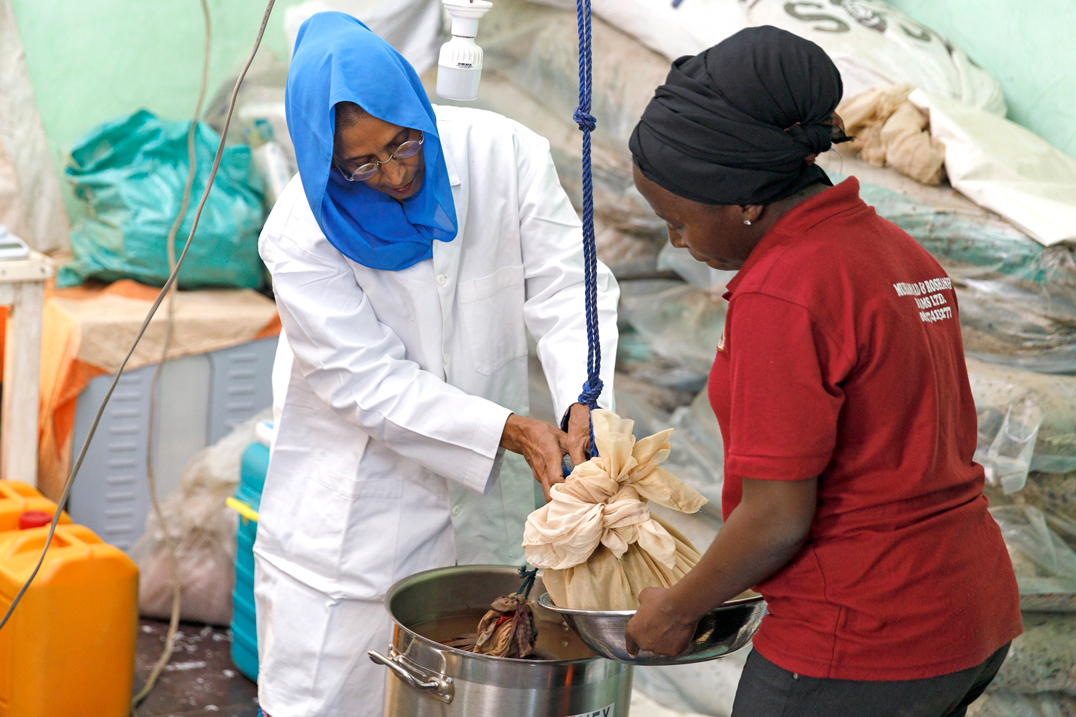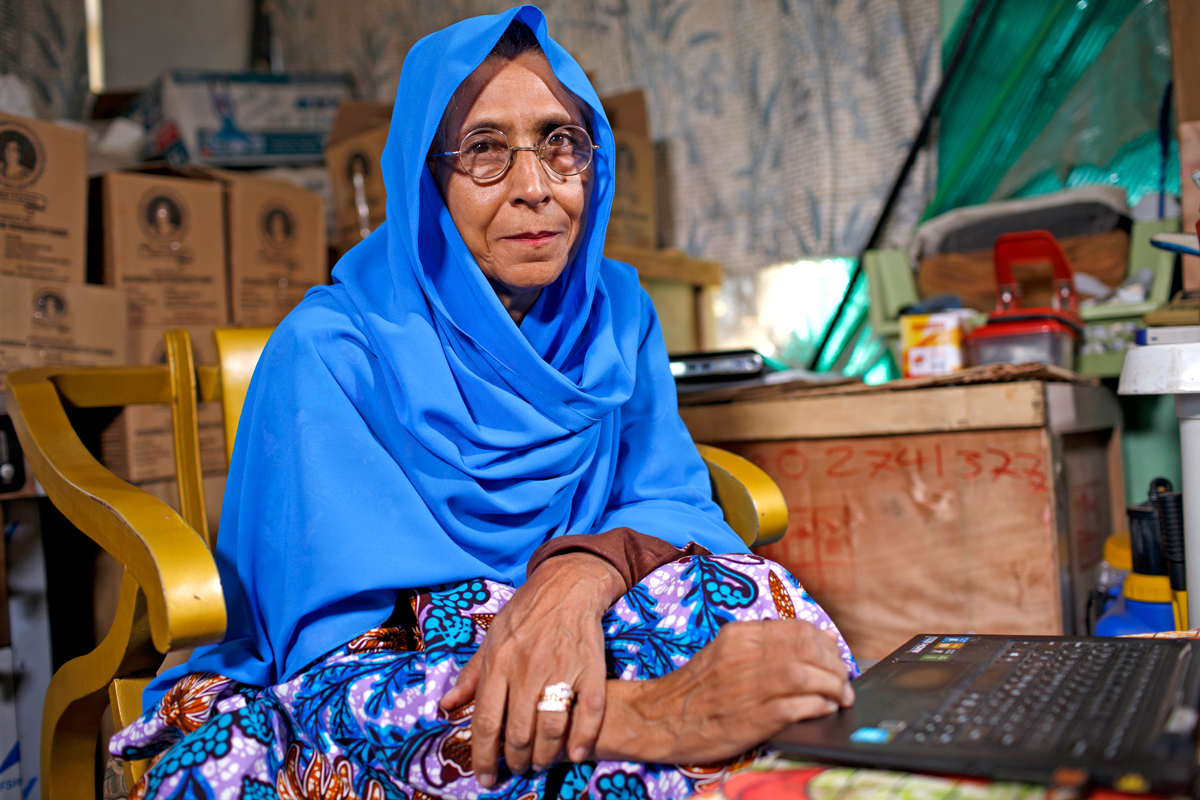
Over 70 percent of women-led businesses in Africa have insufficient access to financial services, and many operate in the informal sector where they lack legal protections. ©FAO/ Misper Apawu
When Augustina Akosua Asor Tufuor was still a student at the University of Ghana Business School and enrolled in a course on business management, she met a group of rural farmers and saw the vast potential for local agricultural products, as well as the hurdles they faced.
She also realized that the snacks that were available in the market were filled with artificial additives, preservatives and high levels of salt and sugar.
“I witnessed firsthand how these farmers, most of whom were small-scale and women, would leave heaps of produce, mainly plantains, cassava and sweet potatoes, simply because they did not have available buyers and the cost of transporting back to their villages was very high. That would leave them with massive losses,” describes Augustina.
It was then that her entrepreneurial spark was ignited and a new business idea was born. With her own savings and family support, she founded Tropical Snacks, which creates all-natural plantain chips from surplus local produce. Her goal was to bridge the gap between small farmers and consumers while providing healthier snack alternatives for the Ghanaian market and beyond.

But she found it hard to expand operations. Access to finance, market information and adequate infrastructure posed significant barriers. Traditional financial institutions were reluctant to support a small, woman-led venture.
“When we first approached bankers for a loan, we were asked to make a deposit of GHS 20 000 (approximately USD 1 200) even before getting the amount we requested. We also had to get a professional evaluator to evaluate our business, which was expensive. Then there was the high interest rate which was over 36 percent,” she explains.
Her challenges are not uncommon. Women consistently face structural barriers that hinder their economic potential and impact their business operations in agrifood systems.
For women in agrifood systems in sub-Saharan Africa—where they make up a large proportion of the workforce—the hurdles are particularly steep, from lack of access to land, credit and technology to the gendered social norms that often undervalue their work.
According to a study by the International Trade Centre (ITC), over 70 percent of women-led businesses in Africa have insufficient access to financial services, while many also operate in the informal sector where they lack legal protections and access to training and market information.

Asma Begum Mirza, a 61-year-old Nigerian agripreneur, had a similar difficulty in accessing loans. In response to skyrocketing prices, Asma decided to grow rice in 2015 to help ordinary citizens access affordable food.
However, worsening security conditions in northern Nigeria soon disrupted her business.
“After about two years of successfully growing rice, it started becoming increasingly difficult and dangerous to go to the farm because of security problems,” she says.
She was eventually forced to relocate, leaving her rice farm behind and starting a new farm near Abuja. However, in doing so, she lost most of her customers.
Like Augustina, Asma faced significant barriers in securing loans as she tried to rebuild her business in a new location. High-interest rates and collateral requirements made it almost impossible to buy appropriate machines for commercial production, and her growth remained stifled.
Skills and opportunities
In 2021, the Food and Agriculture Organization of the United Nations (FAO) along with the ITC launched a targeted programme called Empowering Women and Boosting Livelihoods through Agricultural Trade (EWAT). Spanning six countries, EWAT promotes women’s participation in the context of the African Continental Free Trade Area (AfCFTA). The programme’s objective is to increase women’s competitiveness in trade through strengthened knowledge, skills and access to finance, capitalizing on the new prospects for regional trade created by the AfCFTA agreement. EWAT equips women with the skills and resources needed to engage in national and cross border trade by offering training in product development, sales and marketing, as well as in finance management, bookkeeping and business plan development.
In 2023, both Augustina and Asma participated in Business and Investment Readiness Bootcamps offered by the project in their countries.
“We learned how crucial record keeping in business is when it comes to seeking funds. We now record our sales… and now I can say that we are in a better position to be able to get investors for our business,” Augustina says.
Bridging the gap
Within the EWAT programme, FAO further works with financial institutions to develop products and services tailored to women in agribusiness. This is particularly important in the agriculture sector where many women entrepreneurs rely on their personal savings or informal networks for funding.
“Most women rely on their own financing to go into business… so the programme tries to address this by bringing financial service providers like commercial banks together with women agripreneurs, creating an opportunity for dialogue,” said Bethel Terefe, Senior Gender Expert in the FAO Regional Office for Africa.
Francesca Distefano, EWAT Programme Coordinator, elaborates, “In 2024, we launched a mentorship programme, which provides EWAT beneficiaries with one-on-one dedicated support and advice to navigate business management and expansion… In Ghana and Nigeria, EWAT is also in the process of disbursing small grants to selected women, including to Asma and Augustina, to support them to cover standards certification and formalization of their products.”
By the end of the year, EWAT will deliver finance training and organise meetings with financial institutions to help women agripreneurs present their businesses and explore investment opportunities.
The goal is to ensure that, as Africa’s trade potential increases through the AfCFTA, women also benefit from new opportunities, FAO said.
Source: The FAO News And Media Office, Rome





